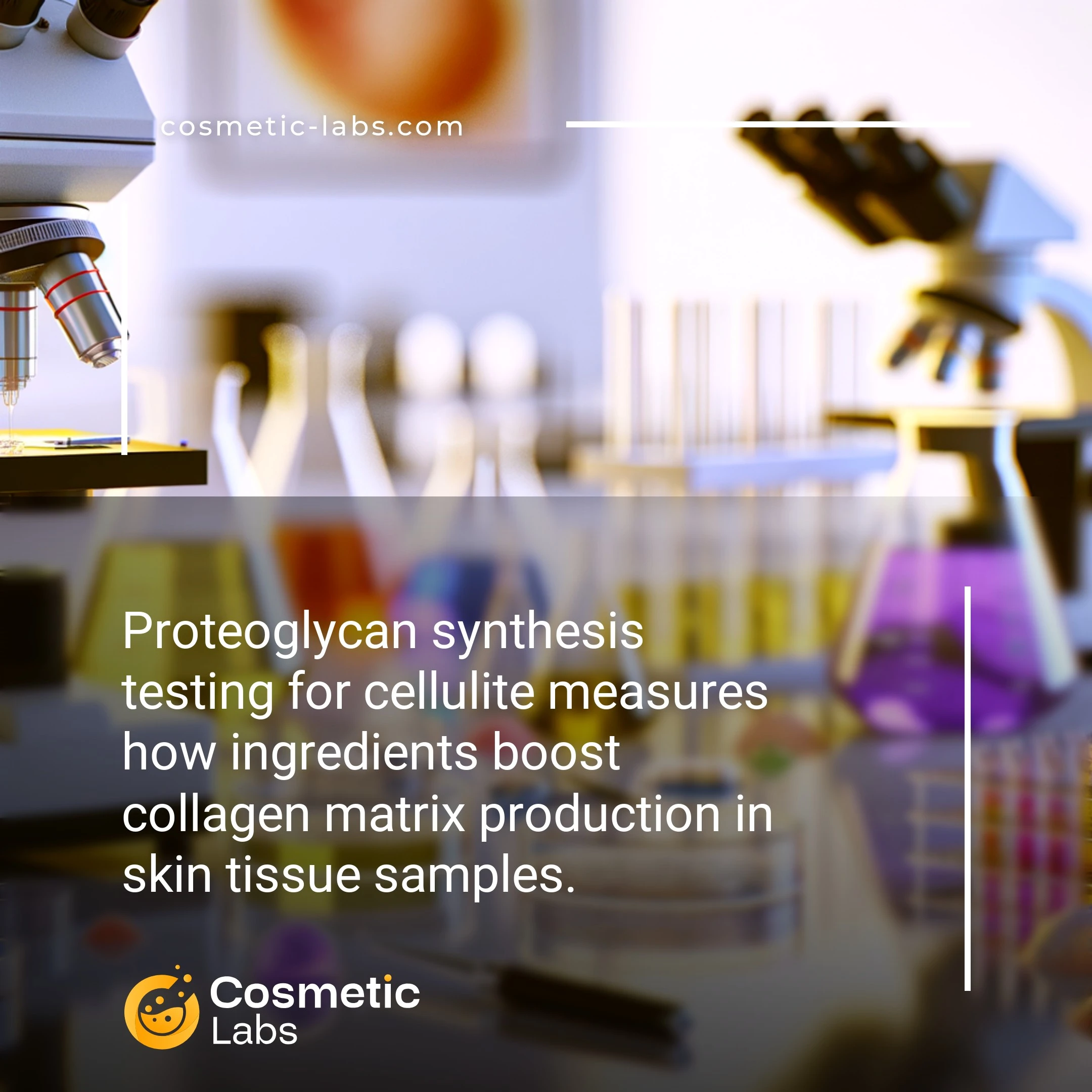Proteoglycan Synthesis Testing for Cellulite Treatment Products

What is Proteoglycan synthesis?
Proteoglycan synthesis testing for cellulite is a specialized assay that measures how anti-cellulite ingredients boost collagen-associated protein production in dermal tissue. Labs use 3D skin models or fibroblast cultures to track proteoglycan markers like decorin and versican, which help maintain skin firmness and reduce the dimpled appearance characteristic of cellulite. This biomarker analysis provides quantifiable data on ingredient efficacy before clinical trials, giving brands concrete proof points for marketing claims.
Why do you need this service?
Cosmetic labs utilize proteoglycan synthesis testing to validate your anti-cellulite formulations before market launch, measuring how active ingredients stimulate collagen production and improve skin elasticity in controlled laboratory environments. This testing approach delivers quantifiable efficacy data that supports regulatory submissions and marketing claims, helping brands demonstrate measurable improvements in skin texture and firmness to consumers and retailers.
Who provides Proteoglycan synthesis services?
All cosmetic labs providing Proteoglycan synthesis services
There is no company providing these services at the moment.
Proteoglycan Synthesis Testing for Cellulite Reduction Claims
Proteoglycan synthesis testing validates how your anti-cellulite ingredients affect the skin’s structural matrix. Labs measure proteoglycan production changes to support efficacy claims for cellulite reduction products within your preclinical testing strategy.
Proteoglycan Production Measurement Methods
Testing labs use proteoglycan synthesis assays to quantify how active ingredients stimulate extracellular matrix components. These tests measure glycosaminoglycan production in dermal fibroblasts and track changes in hyaluronic acid synthesis rates.
Standard testing protocols include:
- Cell culture assays measuring proteoglycan secretion levels
- Biochemical analysis of sulfated glycosaminoglycans
- Time-course studies tracking synthesis over 24-72 hours
- Dose-response curves for ingredient concentration optimization
Data Applications for Product Development
Labs provide quantitative data showing percentage increases in proteoglycan synthesis compared to untreated controls. This data supports marketing claims about skin firmness and cellulite appearance reduction while meeting regulatory requirements for cosmetic efficacy.
Testing results help you:
- Optimize active ingredient concentrations for maximum efficacy
- Compare different formulation approaches
- Build scientific support for product positioning
Connect with specialized labs on our platform to discuss proteoglycan synthesis testing protocols that align with your cellulite product development goals.
Applications of Proteoglycan Synthesis Testing for Cellulite Efficacy
Proteoglycan synthesis testing provides measurable data on how anti-cellulite ingredients affect skin structure and extracellular matrix composition.
Active Ingredient Validation
Labs use proteoglycan synthesis assays for cellulite testing to evaluate botanical extracts, peptides, and synthetic compounds targeting skin firmness. Testing protocols measure hyaluronic acid production, collagen synthesis rates, and glycosaminoglycan content in dermal fibroblast cultures. Results show ingredient concentrations that produce 15-40% increases in proteoglycan synthesis within 72-hour exposure periods.
Brand owners receive dose-response curves and molecular pathway analysis to optimize formulations. This data supports efficacy claims for regulatory submissions and marketing materials.
Formulation Performance Assessment
Complete anti-cellulite formulations undergo proteoglycan synthesis testing to verify ingredient interactions and delivery system effectiveness. Labs test cream, serum, and gel matrices using standardized skin penetration models combined with cell culture assays. Testing reveals how vehicle pH, emulsifier type, and active concentration affect dermal matrix protein production.
Comparative studies show formulation variants producing 20-60% variation in proteoglycan synthesis rates. This testing identifies optimal delivery systems before expensive clinical trials begin.
| Testing Parameter | Measurement Method | Typical Results Range | Testing Duration |
|---|---|---|---|
| Hyaluronic Acid Synthesis | ELISA Quantification | 10-45% increase vs control | 48-96 hours |
| Collagen Type I Production | Western Blot Analysis | 15-50% enhancement | 72-120 hours |
| Glycosaminoglycan Content | Spectrophotometric Assay | 8-35% improvement | 24-72 hours |
| Dermal Fibroblast Viability | MTT Cell Viability Test | 85-110% vs control | 24-48 hours |
Partner with specialized cosmetic labs on our platform to access proteoglycan synthesis testing services tailored to your anti-cellulite product development needs.
